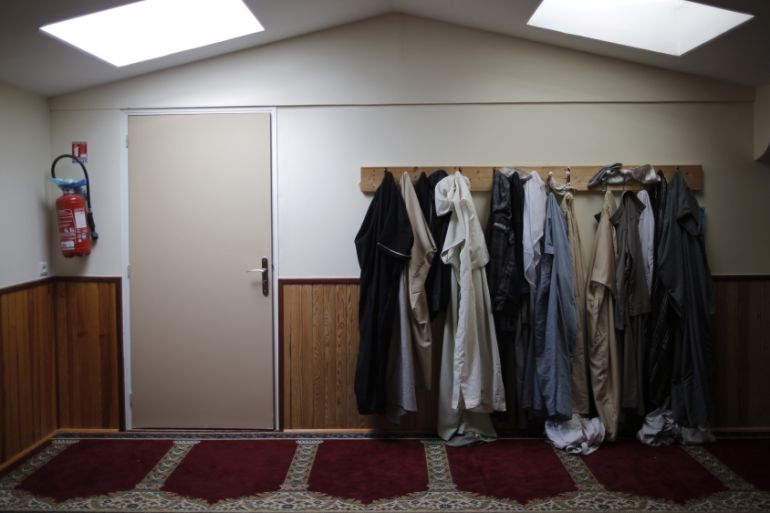Activists decry mosque closures in France
Shutting down “radical” mosques under emergency rule will not prevent security threats, rights groups and activists say.

Closing mosques in France that authorities say foster extremism will not prevent people from becoming ‘radicalised’ and could heighten a sense of alienation among the Muslim minority, rights groups and activists have said.
Bye-bye, tolerant and democratic Europe! It's been nice knowing you: France likely to close more than 100 mosques https://t.co/HC6JHmPQxu
— Mona Nicoara (@monanicoara) December 3, 2015
Keep reading
list of 4 itemsParis attacks suspect apologises to victims, seeks forgiveness
Main Paris attacks suspect Abdeslam says he ‘didn’t kill anyone’
Security high in Paris as biggest trial begins over 2015 attacks
At least three mosques have already been closed under France’s extended emergency rule, which allows authorities to shut down places of worship that show a “pattern of radicalisation”.
A French Imam, meanwhile, said that between 100 and 160 more mosques are likely to be closed as part of the security campaign.
“Experts have proven that terrorists do not come from organised communities,” Samia Hathroubi, a French-Tunisian human rights activist, told Al Jazeera.
France likely 2 close more than 100 mosques https://t.co/61OIfcUTiZ Grotesque, what happened to the word sung in the Marseillaise? Freedom?
— CaroGvS (@Tuva99) December 2, 2015
She added that there was a disconnect between what French President Francois Hollande says to reassure Muslims that they are not being “singled out”, and the reality of raids under emergency law which have “largely targeted mosques and activists from Muslim communities”.
“I am worried and really stunned by the decisions taken by the executive power to tackle terrorism,” she said.
“I feel we should be very cautious in France with civil rights and our freedoms which are jeopardised by the state of emergency.”
The Islamic State of Iraq and the Levant (ISIL) group claimed responsibility for attacks on November 13 in Paris which killed 130 people, raising fears that Muslims would suffer ‘retaliatory’ violence.
“Of course each and every one of us feels under threat and unsecure,” said Hathroubi. “Activists are angry against what we see as an attack against our civil rights and liberties. We knew far too well that we would be the first target of this state of emergency, and we were proven right.”
Just read France will be closing 100-160 mosques for operating "illegally" and "preaching hatred". If that's not state persecution, what is?
— Erica Vásquez (@ericavasquez77) December 3, 2015
Since November, France has raided 2,235 homes and buildings, taken 232 people into custody and confiscated 334 weapons, 34 of them war grade, Interior Minister Bernard Cazeneuve said on Wednesday.
He added that police had that day closed a suspected radical mosque east of Paris and arrested the owner of a revolver found in related raids as part of the crackdown, while two other mosques closed last week were in Gennevilliers, northwest of Paris, and in the southeastern city of Lyon.
“If you listen to anti-terror judges, they will tell you that radicalisation takes place outside of mosques. It happens in jails or clandestine circles or via the internet,” said Yasser Louati of the Collective Against Islamophobia.
“The mosques that have been closed were in operation for several years. Why shut them down today? Radicalisation? We still do not have a clear indication of what that means.”
He added that decisions made to close the mosques had been “arbitrary”.
“Under the emergency state, the law is suspended so they don’t have to justify themselves,” said Louati. “If this [mosque closures] isn’t the denial of religious freedom, I don’t know what is.”
There are between 5.5 million and 6.2 million Muslims in France, roughly 7.6 per cent of total population.
READ MORE: French civil liberties and the ‘spirit of sacrifice’
“We were already lacking a huge number of mosques to cope with demand.
“Politicians have before complained about people praying in the street. Where are people going to pray now?” said Louati.
|
|
In the first few weeks of emergency rule, police used an unnecessary level force while targeting raids and searches on Muslims’ homes, businesses and meeting places, he said.
When a shelter for underprivileged women in a southern Parisian suburb was raided, he alleged, police inappropriately touched one woman.
“With this brutality, we may be sewing the seeds of radicalisation for the next 20 years,” he said. “The effect could be further humiliation, alienation and resentment towards the government.”
Follow Anealla Safdar on Twitter: @anealla